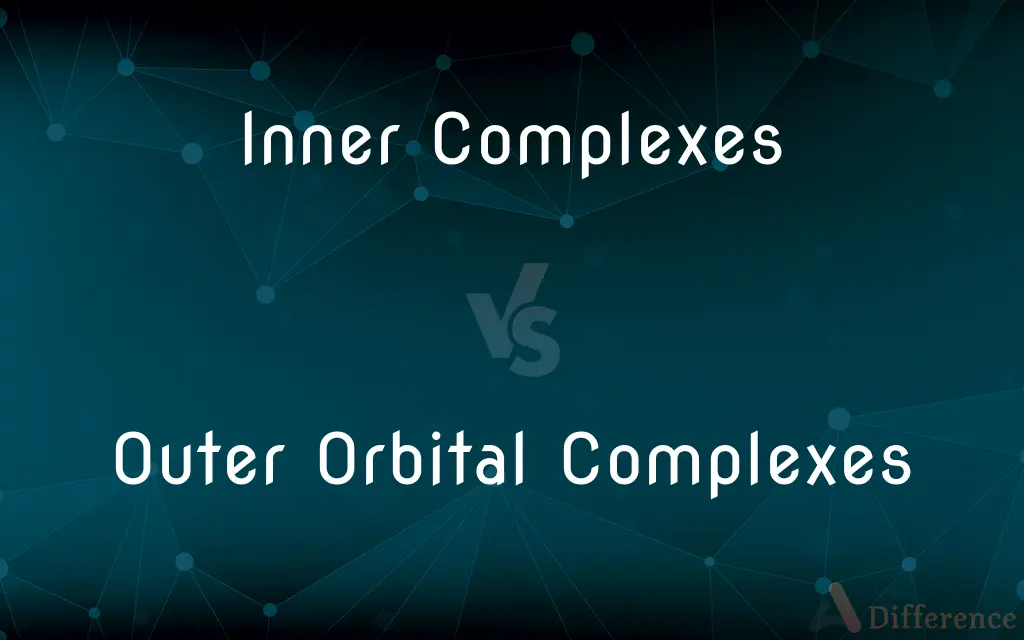Inner Complexes vs. Outer Orbital Complexes — What's the Difference?
By Tayyaba Rehman — Published on December 27, 2023
Inner Complexes refer to psychological constructs of emotions, thoughts, and memories. Outer Orbital Complexes pertain to chemistry, describing metal complexes with electron occupancy in outer d orbitals.

Difference Between Inner Complexes and Outer Orbital Complexes
Table of Contents
ADVERTISEMENT
Key Differences
Inner Complexes are primarily used within the realm of psychology. They represent deep-seated patterns of emotion, memory, and perception that influence behavior. These are unconscious structures that may arise from past experiences or inherent psychological constructs. On the other hand, Outer Orbital Complexes are entirely unrelated and belong to the field of inorganic chemistry. They describe coordination compounds where the central metal atom or ion has electrons in its outermost d orbitals.
Diving deeper into Inner Complexes, one would realize they often have their roots in childhood experiences or traumas. They shape the way an individual perceives and interacts with the world. These complexes can sometimes be the source of certain behaviors, neuroses, or patterns that seem inexplicable on the surface. Conversely, Outer Orbital Complexes are a matter of electron configuration and bonding. In these complexes, the ligands bond with the metal using its outer d orbitals, leading to specific magnetic and spectral properties.
While Inner Complexes might need therapeutic intervention or introspection to understand and address, Outer Orbital Complexes require chemical analysis. The former deals with the intricacies of the human psyche, while the latter is concerned with molecular and atomic interactions in coordination compounds.
In summary, the term Inner Complexes deals with deeply rooted psychological constructs, which influence an individual's behavior and perception. Outer Orbital Complexes, meanwhile, describe specific chemical compounds and their electron configurations, particularly in inorganic chemistry.
Comparison Chart
Field of Study
Psychology
Inorganic Chemistry
ADVERTISEMENT
Description
Deep-seated psychological patterns
Metal complexes with electrons in outer d orbitals
Origin
Arise from past experiences or inherent psychological structures
Result from the nature of metal-ligand bonding
Application
Understanding human behavior and emotions
Analyzing the properties and behavior of certain coordination compounds
Analysis
Requires introspection or therapeutic intervention
Requires chemical analysis
Compare with Definitions
Inner Complexes
A set of intertwined memories and emotions.
Therapy helped him unravel his Inner Complexes.
Outer Orbital Complexes
Metal compounds with outer d orbital participation.
The electron configuration in Outer Orbital Complexes is crucial for their properties.
Inner Complexes
Patterns of emotions and thoughts influencing behavior.
Her fear of abandonment was tied to Inner Complexes from her past.
Outer Orbital Complexes
Chemical entities exhibiting specific magnetic and spectral properties.
Outer Orbital Complexes often display distinctive colors.
Inner Complexes
Unconscious constructs shaping perception.
Despite his success, his Inner Complexes made him feel inadequate.
Outer Orbital Complexes
Chemical structures defined by outer d orbital bonding.
The ligands in Outer Orbital Complexes bond using the metal's outermost d orbitals.
Inner Complexes
Deep-rooted psychological structures.
Childhood traumas can lead to the formation of Inner Complexes.
Outer Orbital Complexes
Inorganic complexes with specific electron configurations.
Studying Outer Orbital Complexes helps in understanding molecular interactions.
Inner Complexes
Deep-seated reasons behind certain behaviors.
Understanding one's Inner Complexes can lead to personal growth.
Outer Orbital Complexes
Coordination compounds with electron occupancy in outer d orbitals.
The nature of the metal-ligand bond in Outer Orbital Complexes is unique.
Common Curiosities
Can Inner Complexes influence behavior?
Yes, Inner Complexes can shape and influence an individual's behavior and emotions.
What's the significance of Outer Orbital Complexes in inorganic chemistry?
They help understand specific metal-ligand bonding and the properties of certain coordination compounds.
Are Outer Orbital Complexes related to electron configuration?
Yes, they specifically pertain to electron occupancy in a metal's outermost d orbitals.
How are Outer Orbital Complexes different from other coordination compounds?
They are defined by the participation of the metal's outer d orbitals in bonding.
What are Inner Complexes related to?
Inner Complexes relate to deep-seated psychological constructs.
Can therapy address Inner Complexes?
Yes, therapy can help individuals understand and navigate their Inner Complexes.
How do Outer Orbital Complexes fit into chemistry?
Outer Orbital Complexes describe coordination compounds with electron occupancy in outer d orbitals.
Can Outer Orbital Complexes be colorful?
Yes, many Outer Orbital Complexes display distinctive colors due to their specific electron configurations.
Do Outer Orbital Complexes have unique properties?
Yes, due to their electron configuration, they exhibit specific magnetic and spectral properties.
Do Inner Complexes always originate from trauma?
Not always, but traumas can be a significant source of some Inner Complexes.
Are Inner Complexes conscious patterns?
No, they are often unconscious and might require introspection to identify.
Are Inner Complexes innate or developed?
They can be both, arising from inherent psychological structures or developing from past experiences.
Is awareness of Inner Complexes beneficial?
Yes, understanding one's Inner Complexes can aid in personal growth and better emotional well-being.
Can understanding Inner Complexes impact relationships?
Yes, by understanding and addressing Inner Complexes, one can improve interpersonal relationships.
In what field would one study Outer Orbital Complexes?
They are studied in inorganic chemistry.
Share Your Discovery

Previous Comparison
Schezwan Noodles vs. Hakka Noodles
Next Comparison
Mexican Mafia vs. Mexican CartelAuthor Spotlight
Written by
Tayyaba RehmanTayyaba Rehman is a distinguished writer, currently serving as a primary contributor to askdifference.com. As a researcher in semantics and etymology, Tayyaba's passion for the complexity of languages and their distinctions has found a perfect home on the platform. Tayyaba delves into the intricacies of language, distinguishing between commonly confused words and phrases, thereby providing clarity for readers worldwide.
















































